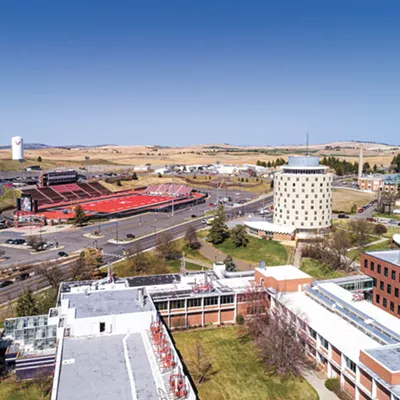In late March, a judge found Initiative 2066, which was promoted as a way to preserve natural gas choice for energy customers, violated multiple provisions of the Washington State Constitution.
Voters passed I-2066 with 51.7% of the vote in November, after building industry proponents successfully promoted the measure to "stop the gas ban."
However, environmental organizations filed a lawsuit after the measure passed, arguing it was unconstitutionally broad in scope, and in an oral ruling on March 21, King County Superior Court Judge Sandra Widlan found that I-2066 violated two sections of the state constitution.
Kai Smith, the attorney for the plaintiff environmental organizations and a partner at Pacifica Law Group, which was tasked with writing the final order to the judge's specifications, says Widlan's ruling boiled down to three points.
First, the measure violated the "single subject" rule of Article 2, Section 19 of the constitution, which requires that laws passed by lawmakers or the people only deal with one subject.
Because the initiative not only requires local governments and utilities to provide natural gas (saying they can't even discourage its use) but also specifically limits clean air agencies' ability to regulate air pollution, changes the state's building efficiency standards, and alters a state law regulating utilities, Widlan found it dealt with more than one subject.
"A voter may well want to have access to natural gas, but at the same time want the government to regulate air pollution from natural gas," Widlan said. "These provisions are unrelated and not germane to one another."
Attaching an undesirable change along with a desirable change is known as logrolling, which is what the single subject rule is meant to prevent.
"The body of the initiative is so broad and free ranging that it makes it hard to say with any precision what the general topic is," Widlan said of I-2066. "There needs to be rational unity between the provisions of an initiative so you don't end up in a situation where voters are voting for something that they don't want in order to get something they do want."
Secondly, Widlan found that the initiative violated the second part of the single subject rule, which requires the subject to be in the title. She similarly pointed to changes to air pollution regulation, building efficiency standards and utility planning, which were not in the title.
Finally, the judge found the initiative violated Article 2, Section 37 of the state constitution, which requires that initiatives clearly spell out which state laws will be amended. Widlan cited examples from the plaintiffs' briefs, such as a law requiring the Department of Commerce to develop and implement a plan to reduce greenhouse gases, which would be impacted but weren't in the body of the initiative.
"Voters were deprived of knowing clearly and fully what the impact of the measure was on other areas of state law," attorney Smith says. "It's a vindication of the view that this coalition had of 2066 since it was filed a year ago now."
While the ruling was lauded by environmental groups as a win, the defendants, including the state Attorney General's Office, which is tasked with defending voter initiatives, and the Building Industry Association of Washington, or BIAW, have said they will appeal the ruling to the state Supreme Court.
"We know there will be an appeal ahead, and we look forward to bringing these same arguments before the Washington Supreme Court, and we expect to have a similar outcome," Smith says.
Greg Lane, executive vice president for the BIAW, says the association was disappointed but not surprised by the ruling.
"Regardless of the outcome of the Superior Court, this case was going to go to the Supreme Court, either side was going to appeal," Lane says. "We'll have a much fairer venue."
Lane argues that the initiative is legal, because the restrictions on, say, air pollution, were required to maintain access to natural gas.
"You can't protect natural gas without restricting governments from reducing it," Lane says. "To protect it, you have to prevent local governments from being able to restrict or ban it. ... They are connected."
Lane also disagreed that the title was confusing to voters, because it was written by the Attorney General's Office after the plaintiffs in this case challenged the title in court early last year. Either way, he argues that voters clearly understood all of the initiatives, considering the results of the other ballot initiatives in November.
"They were very discerning. Some, they rejected outright, others they rejected on a slim margin, and ours they passed," Lane says. "I think they very clearly understood what the impacts were, and they chose accordingly."
For everyday people, the impacts of the ruling remain to be seen.
Few communities had changed their permitting process to adhere to the initiative since it took effect in December, Lane says, so it's not clear how many building projects may have submitted applications under the reduced energy restrictions the initiative called for.
Widlan's ruling means Washingtonians will be protected from higher utility bills and have more access to clean and efficient energy, says Megan Larkin, the clean buildings policy manager for Climate Solutions, a nonprofit that advocates for environmental policy changes.
Larkin and Leah Missik, acting Washington director for Climate Solutions, noted, for example, that state incentives to help people install electric heat pumps had been temporarily paused.
"Our understanding is that said programs should be able to continue, and we have already heard positive signs, for example, from the Utilities and Transportation Commission, on moving forward with certain programs that had been on hold," Missik says.
Cameron Steinback, climate justice program manager for Front and Centered, a nonprofit that advocates for environmental justice in overburdened communities, says the organization was similarly pleased with this ruling.
"It was misleading and not truly in the interest of Washingtonians, not in the interest of frontline communities, and not consistent with our climate rules as a state," Steinback says. "[It] was a little bit nefarious in its nature, trying to further commit us to a fossil fuel future, and that's something that's not going to really prioritize the health and safety and well-being of our communities."
After the final ruling is entered in King County Superior Court this week, the state and BIAW will have 30 days to file a notice of appeal, then will get another 15 days to seek direct review by the Washington Supreme Court. The plaintiffs will get 14 days to respond, and if, as expected, the state Supreme Court accepts review, it could be months before the case is heard. ♦
























